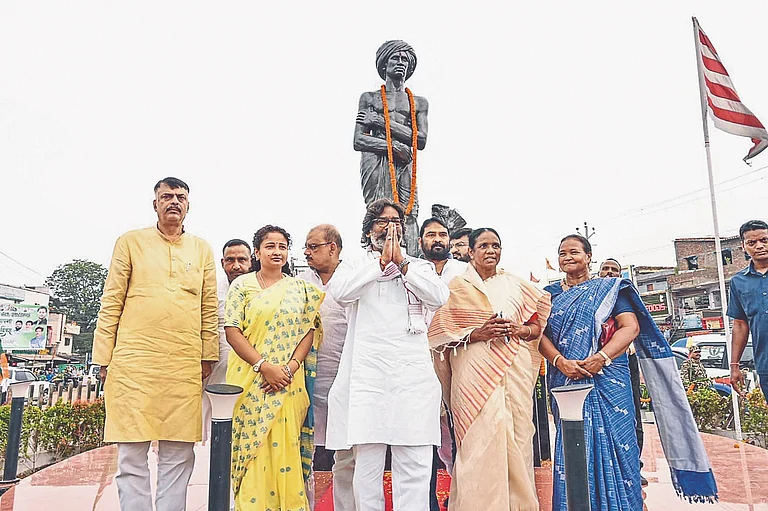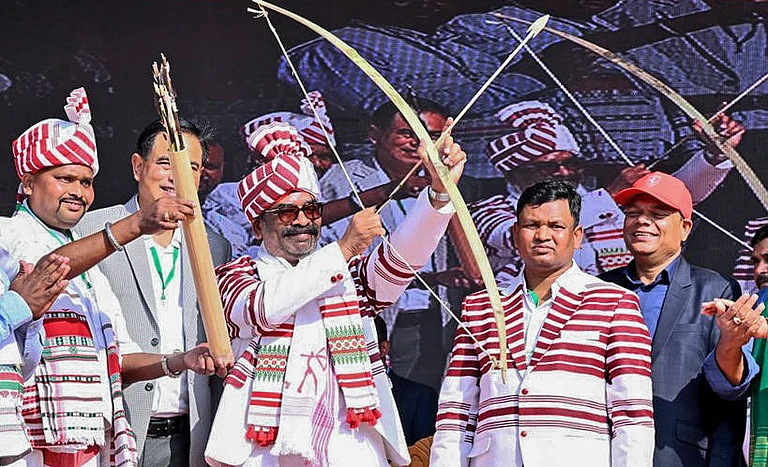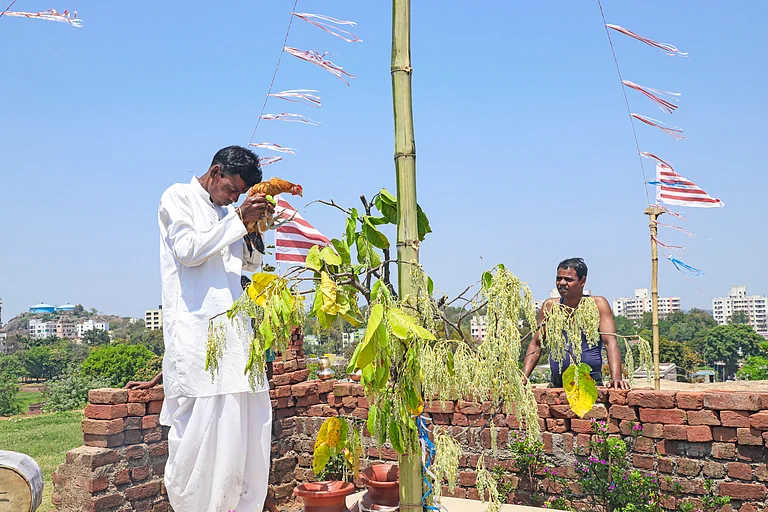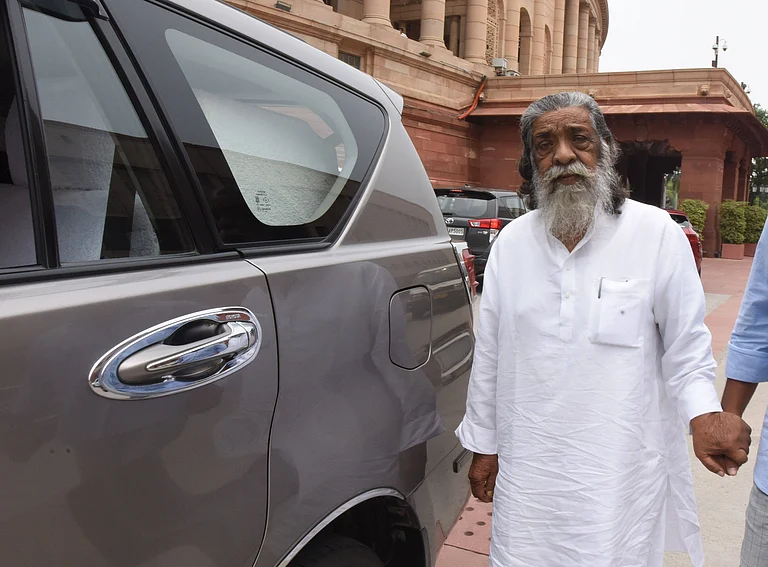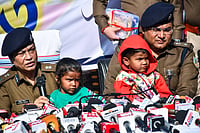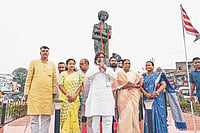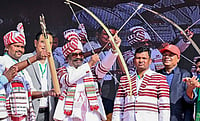
Shibu Soren, a key figure in the Jharkhand Mukti Morcha, died on August 4, 2025.
Soren, also known as Dishom Guru, led grassroots movements that united tribal communities in Jharkhand.
While Soren was at the centre of several controversies, he had a brief stint as CM of Jharkhand, and was a towering figure in the tribal rights movement
Between 1970 and 1975, the movement of the Koylanchal Workers’ Union in Jharkhand had gathered significant momentum. Most of the participants were rural farmers and labourers raising their voices for their rights. Leaders like Comrade A K Roy and Binod Bihari Mahato were working to channel these voices beyond trade unionism into a broader people’s movement. Around the same time, a young man from the Santhal region had begun raising a clandestine voice against moneylenders and exploiters. His fiery speeches challenged the status quo and inspired the masses. It was then that Comrade A K Roy noticed him and saw in him a spark reminiscent of Lenin. Roy remarked that just as Lenin had led the Russian Revolution, this young man seemed destined to lead Jharkhand’s own revolution.
That young man would later come to be known by many names: Dishom Guru, Guruji, and Shibu Soren. On August 4, at the age of 81, Shibu Soren breathed his last at Sir Ganga Ram Hospital in Delhi. Prime Minister Narendra Modi personally visited the hospital to pay his respects and console his son, Jharkhand Chief Minister Hemant Soren. In a tweet in the Santhali language, the Prime Minister said, “Shibu Soren dedicated his entire life to the welfare of tribal communities, and he will always be remembered for it.”
Opposition leader Rahul Gandhi and several other senior leaders from across the country also visited the hospital to bid farewell. Even President Droupadi Murmu had visited during his treatment to inquire about his condition.
To understand how a man from a humble tribal background, shattered by his father’s murder, went on to become a voice of Jharkhand’s people, one must understand the struggle of Shibu Soren’s life.
Shibu Soren's life and political journey are emblematic of the tribal politics of Jharkhand, the fight against social injustice, and the struggle for regional identity. His activism spanned many fronts—protecting tribal rights, the battle to safeguard land, the demand for a separate Jharkhand state, and participation in national politics.
Born on January 11, 1944, in Nemra village (now in Ramgarh district), Shibu Soren’s early life was marked by hardship. His father, Shobaran Soren, was a schoolteacher who was murdered by landlords and moneylenders over land issues on November 27, 1957. This incident proved to be the turning point in young Shibu’s life.
Shibu Soren launched a campaign in tribal areas against the exploitative practices of moneylenders and landlords, known locally as dhanakads. Between 1965 and 1970, he initiated the Dhankatni Andolan (harvest seizure movement), where youth-led groups harvested crops grown on tribal land that had been encroached upon without seeking permission from the moneylenders. In many places, he helped tribals reclaim their land.
From 1970 to 1990, Shibu Soren remained actively involved in the movement for a separate Jharkhand state. Alongside comrades like A K Roy and Binod Bihari Mahato, he intensified the demand for a separate state. Public support for the movement surged. In 1972, the Jharkhand Mukti Morcha (JMM) was founded as a political party.
“What stood out to me about him, as a tribal politician, was the uniqueness of his character,” said Professor Sanjay Basu Mallik, who worked with Shibu Soren for many years. He added, “I first met Guruji in 1975. He was very young then.”
Mallik pointed out that Soren was unique in comparison to other politicians. “Take Jaipal Singh Munda for comparison—he went to England at the age of 12 or 13, received an elite education, saw the world, and was a brilliant speaker. That was one extreme. Shibu Soren was the other extreme—a man from a village, unlettered, raw like a new sapling, with no exposure to the outside world. Yet after one traumatic event, he transformed into a firebrand. He directly confronted the administration and the government. His speeches showed he was deeply rooted in the land. These were the qualities that impressed Comrade A K Roy, who saw in him a Lenin-like figure.”
The differences between Shibu Soren and Jaipal Singh Munda were stark. While Munda chose negotiation across the table to push for a separate state, Shibu Soren took the battle to the streets. Where Munda’s pleas failed to shake the system, Soren’s movement succeeded in instilling fear and urgency.
At one point, the union of Shibu Soren and Binod Bihari Mahato was famously known as the Manjhi-Mahato combine. Their alliance was instrumental in uniting Koeris, Kurmis, and the region’s largest Santhal population in support of the separate state movement. After the Emergency, the partnership fractured, and eventually, Soren entered negotiations on the statehood issue. In 1995, the Jharkhand Autonomous Council was formed under unified Bihar, and Shibu Soren was appointed its chairman. He played a key role in the formation of Jharkhand on November 15, 2000.
“Shibu Soren always fought for workers and farmers in a direct, no-nonsense manner. When it came to land, he believed in direct action—occupy and cultivate,” said Prabhakar Tirkey, who worked with Soren in the Autonomous Council, He added that Soren “saw moneylenders, capitalists, and corrupt officials as enemies. He would say, ‘Raise your bows and arrows and fight.’ He was a man of clear ideas, and that’s why people rallied around him. His politics was grounded in mass movements. He fought against the Mahajani system and for the rights of farmers and labourers. This movement shaped the political landscape of Jharkhand. He knew exactly why and for whom he was fighting. That clarity made JMM strong on the ground.”
During these years of struggle, Shibu Soren also faced multiple cases, including murder charges. It was said that he conducted underground movements while hiding in forests, often changing his hideouts two or three times in a single night to avoid police capture.
Soren’s formal political career began with parliamentary politics. He was first elected to the Lok Sabha from Dumka in 1980, and then again in 1989, 1991, 1996, 2002, 2004, and 2009. He served as a minister in the UPA government in 2004 but had to resign amid controversy. His career was not without scandal—he was implicated in the 1993 JMM bribery case, where MPs were accused of accepting money to save the Congress government. In 2006, he was convicted and jailed, but later acquitted by a higher court.
Shibu Soren served as Chief Minister of Jharkhand three times. The first time was in 2005, but he failed to prove a majority and resigned within nine days. His second term began in 2008, but the government collapsed within months. On December 30, 2009, he took oath as CM for the third time, but had to resign again in June 2010 after losing a by-election in the Tamar Assembly seat.
Senior journalist Faisal Anurag describes his passing as a major loss for the state. He says Soren symbolised the legacy of both the Santhal Hul Rebellion and the Chotanagpur Ulgulan uprising. He is credited with bringing together tribal and indigenous communities under a unified political vision.









